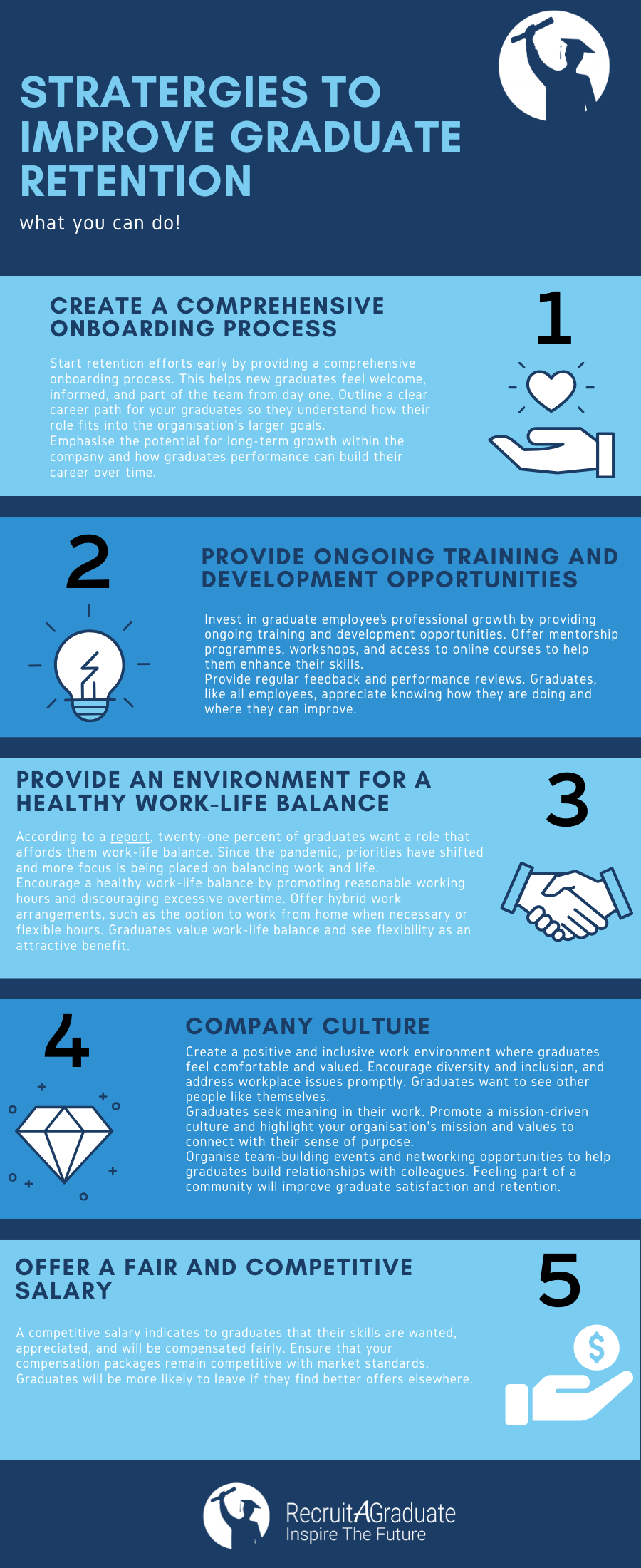
Graduates bring new ideas and fresh perspectives to an organisation, which translates into valuable market knowledge and business success. Graduate retention is essential for organisations looking to cultivate a pipeline of talented, dedicated employees.
Retaining graduates can be challenging, especially in competitive job markets, so knowing why they leave a job is crucial. Given our experience working in the graduate space, common reasons for quitting include:
- A poor culture fit leading to an absence of belonging.
- A lack of work ready skills which leads to a feeling of inadequacy.
- The job doesn’t meet their expectations.
- Failure to understand what the job entails when accepting the role.
- A lack of percieved growth opportunities.
- No suitable mentorship.
All of these issues can be addressed with the right strategies in place.
Strategies to improve graduate retention

1. Provide a comprehensive onboarding process
Start retention efforts early by providing a comprehensive onboarding process. This helps new graduates feel welcome, informed, and part of the team from day one. Outline a clear career path for your graduates so they understand how their role fits into the organisation's larger goals.
Emphasise the potential for long-term growth within the company and how graduates performance can build their career over time.
2. Provide ongoing training and development opportunities
Invest in graduate employee’s professional growth by providing ongoing training and development opportunities. Offer mentorship programmes, workshops, and access to online courses to help them enhance their skills. Reverse mentoring is a powerful tool for knowledge sharing and upskilling and benefits senior employees too. A mentor is typically thought to be more senior and experienced than their mentee. Reverse mentorship, however, acknowledges that both parties have skill gaps and that each individual can improve their shortcomings with the assistance of the other's strengths.
Provide regular feedback and performance reviews. Graduates, like all employees, appreciate knowing how they are doing and where they can improve. Graduates seek recognition at work, acknowledging their achievements and contributions will boost morale and motivate graduate employees.
3. Provide an environment for a healthy work-life balance
According to a report, twenty-one percent of graduates want a role that affords them work-life balance. Since the pandemic, priorities have shifted and more focus is being placed on balancing work and life.
Encourage a healthy work-life balance by promoting reasonable working hours and discouraging excessive overtime.
Offer hybrid work arrangements, such as the option to work from home when necessary or flexible hours. Graduates value work-life balance and see flexibility as an attractive benefit.
4. Company culture
Create a positive and inclusive work environment where graduates feel comfortable and valued. Encourage diversity and inclusion, and address workplace issues promptly. Graduates want to see other people like themselves. No-one wants to feel like an outsider, so ensure you have a diverse staff complement when wanting to attract diversity candidates.
Graduates seek meaning in their work. Promote a mission-driven culture and highlight your organisation's mission and values to connect with their sense of purpose.
Organise team-building events and networking opportunities to help graduates build relationships with colleagues. Feeling part of a community will improve graduate satisfaction and retention.
5. Offer a fair and competitive salary
A competitive salary indicates to graduates that their skills are wanted, appreciated, and will be compensated fairly. Ensure that your compensation packages remain competitive with market standards. Graduates will be more likely to leave if they find better offers elsewhere.
Exit interviews
Conduct exit interviews to gather feedback from graduates who choose to leave. The graduate’s reasons for leaving and workplace experience are discussed during an exit interview. Use this information to identify areas for improvement in your retention strategies. Done correctly, exit interviews will have an extremely positive impact on a business.
Graduate retention is an ongoing process that requires attention and adaptation. By implementing these strategies, you will increase the likelihood of retaining your talented graduates and building a loyal and skilled workforce.
At RecruitAGraduate we prepare our graduates for the workplace by managing their expectations during the vetting and interview process. This, along with these simple strategies, goes a long way towards retaining graduates and their talent.
Ask us about our pool of skilled graduates and experience hassle free graduate hiring with RecruitAGraduate. Learn more or contact us here.
